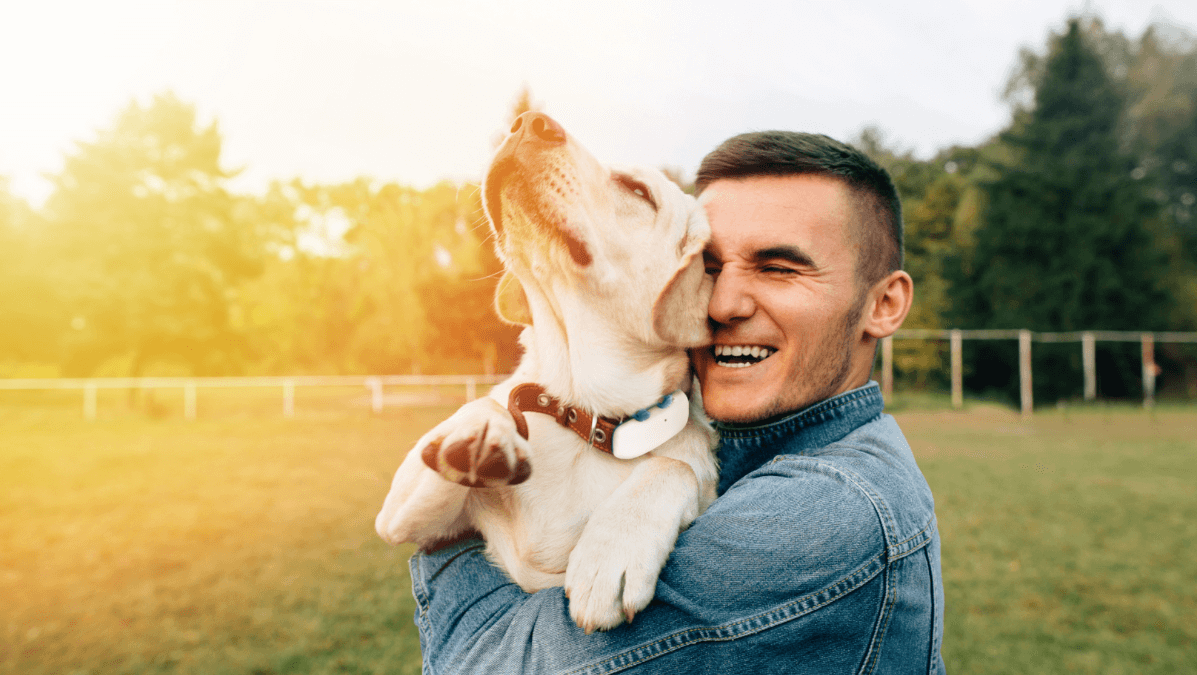How To Get Your Dog To Sleep Through The Night
Wondering how to get your dog to sleep through the night? Turns out, there are a whole bunch of reasons why they might be tossing and turning (and causing you to lose out on a good night's rest.) Here's what you can do - and why tracking their sleep cycles matters.
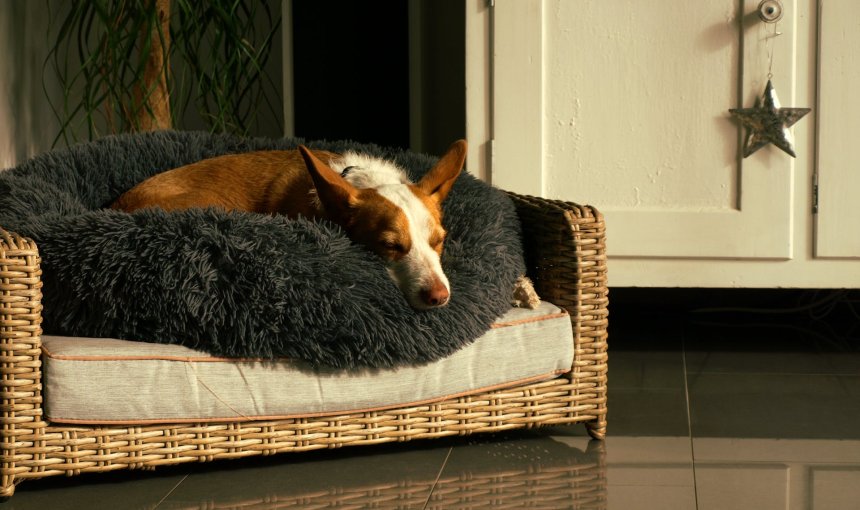
Just like humans, our furry friends need a good night’s rest. Good sleep helps your buddy grow strong, heal injuries, and have energy to run and play and stay active the next day. So if you’ve found yourself waking up to hear them tossing and turning, you might’ve wondered – how to get your dog to sleep through the night? And why is my dog’s sleep getting disturbed so often?
Sleep disturbances in dogs can be due to a whole bunch of reasons – some benign, others more serious. For example, a change in sleep cycles in senior dogs can even indicate cognitive decline. And sadly, if your dog doesn’t sleep well at night, it’s unlikely you will either.
So if you’re ready to get a good night’s rest – as well as your buddy – keep reading. We’re going to help you figure out how to get your dog to sleep through the night – and also how to track their sleep to catch on to health issues early. (Without sacrificing your own night’s rest.)
9 reasons why your dog doesn’t sleep at night
Adult dogs naturally sleep 12-18 hours during each 24-hour period. But if your dog gets most of their sleep during the day, they won’t sleep at night. A dog that is restless or awake most of the night is sending you a message. They may be:
- Uncomfortable
- Stressed
- Or just not tired enough to sleep through the night
Puppies have erratic sleeping habits and are unlikely to sleep through the night until they are about four months old. So your little buddy might need more sleep than an adult dog. But they tend to sleep for short periods and then awaken in a burst of puppy energy. If a puppy naps in the evening, they may be raring to go when you are ready for bed.
Read more: How to tire out a puppy
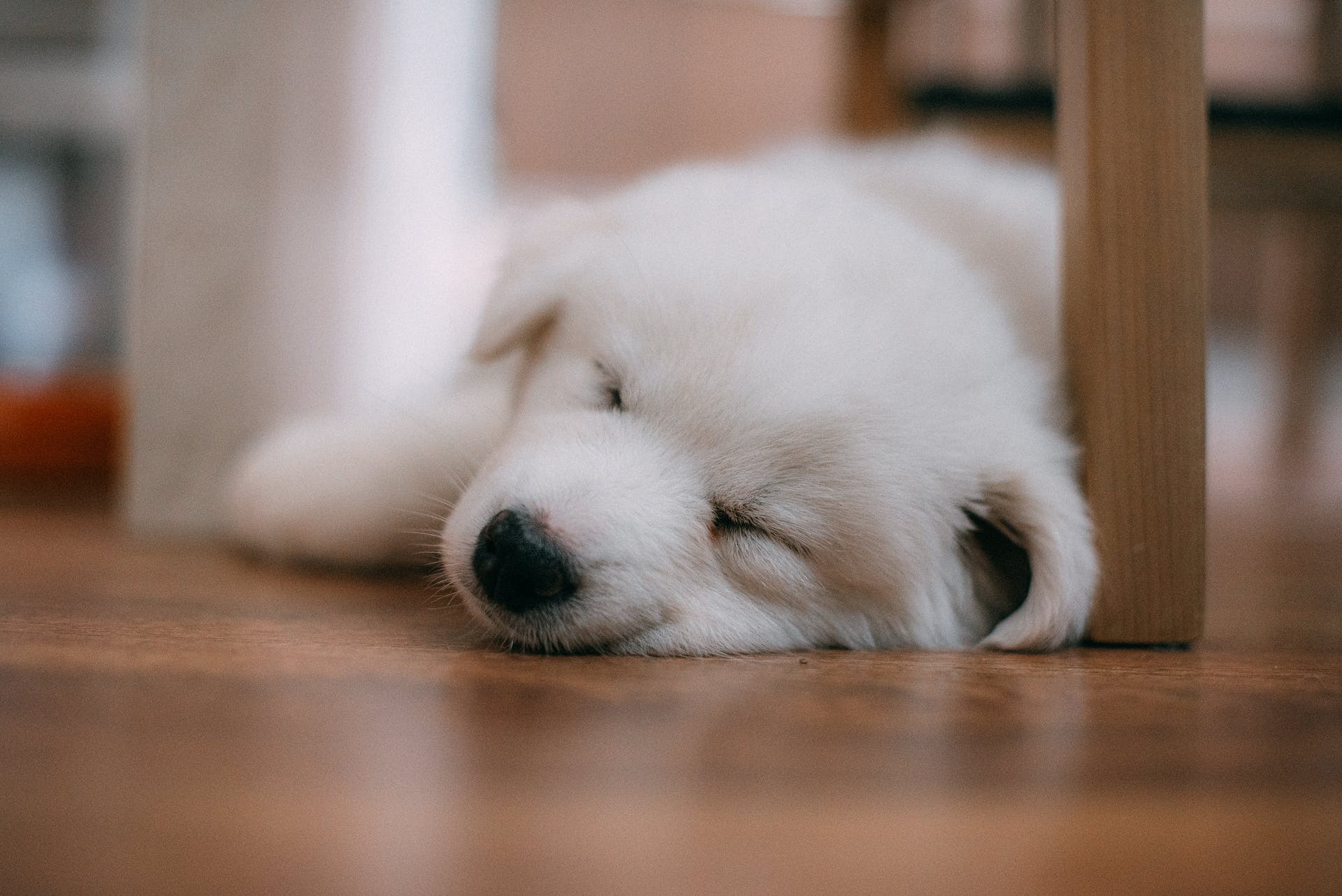
Let’s explore some of the reasons that your adult dog or puppy won’t sleep at night.
They haven’t gotten enough exercise
If you are at work all day and your dog is home alone, they may get bored and doze off during the day. Although napping is certainly better than being destructive while you are away, your dog has built an energy reserve that was not expended during the day. A dog in this situation is well-rested by the time you get home and is now prepared to pull an all-nighter.
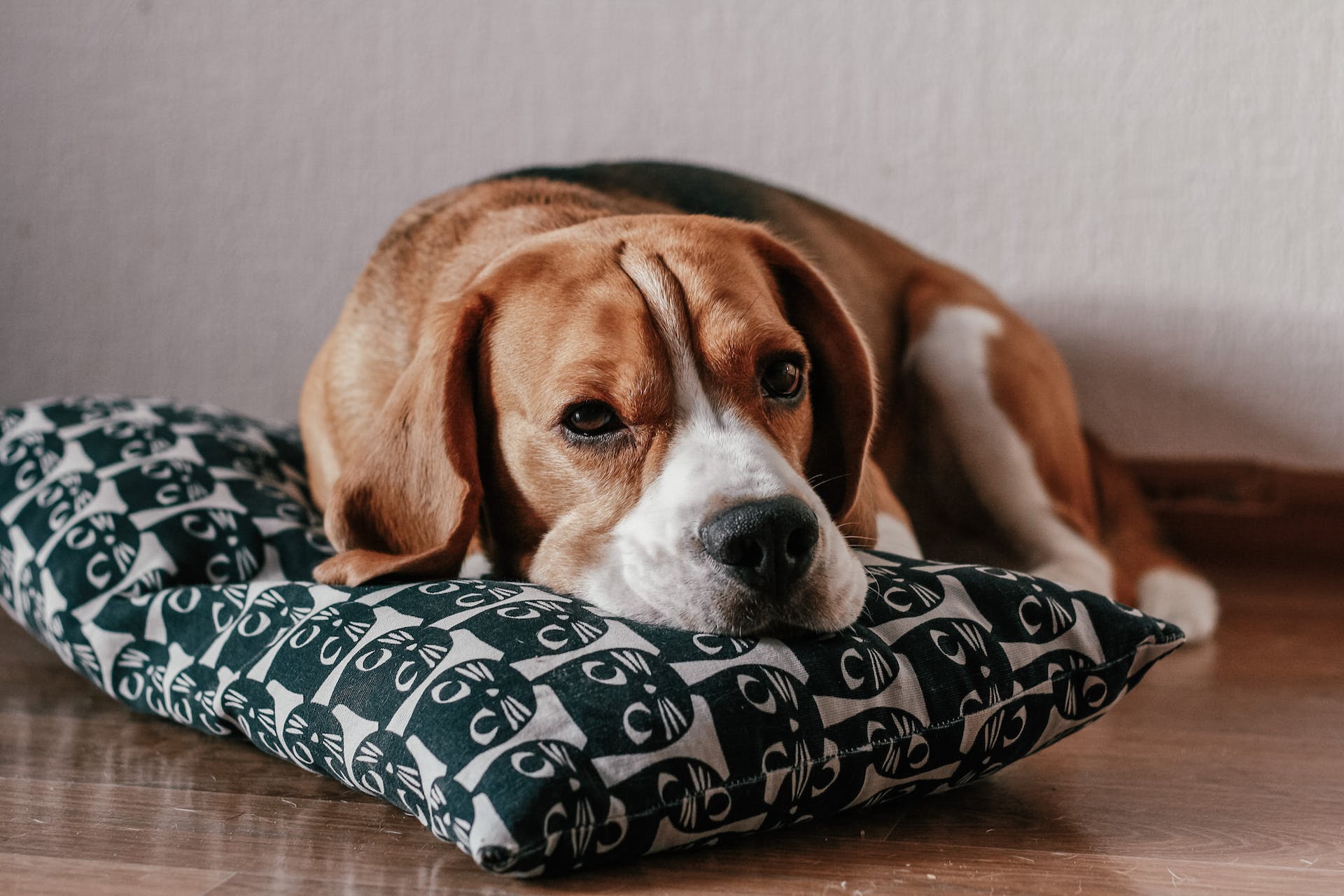
💡Your Tractive GPS comes with a built-in motion detector – picking up your dog’s movements throughout the day. Which you can use to ensure they’ve gotten enough exercise…or if they seem more lethargic than usual. (Which can indicate they’re sick.)
They’re lonely
Your dog is your best friend, right? If you are away from home most of the day, your pup wants to be with you as much as possible when you are home – including at night. If a cold nose is nudging your toes at midnight looking for a playmate, your dog is telling you that they need more time with you.
Read more: How to leave your dog home alone without feeling guilty.
They’re sick or in pain
It’s possible that your dog is experiencing pain when they lie down for the night.
- Perhaps your senior dog has joint pain stemming from arthritis.
- Digestive issues, such as from food intolerance, may be preventing your dog from getting restful sleep.
If you notice that your dog paces, whines, pants, or licks or bites their body in a harmful way, they may have a medical issue that disrupts their sleep. And if you suspect a medical issue might actually be the case, make sure to drop by your local vet. Once you know the cause of your dog’s discomfort, you can try to alleviate the problem that prevents them from sleeping through the night.
But here’s the scary part: a sick or injured dog might even seem completely normal, happy, or even healthy. Much like cats, sick dogs tend to mask any signs of discomfort or pain. So it’s easy to miss out on changes in their sleep habits – often until it’s too late.
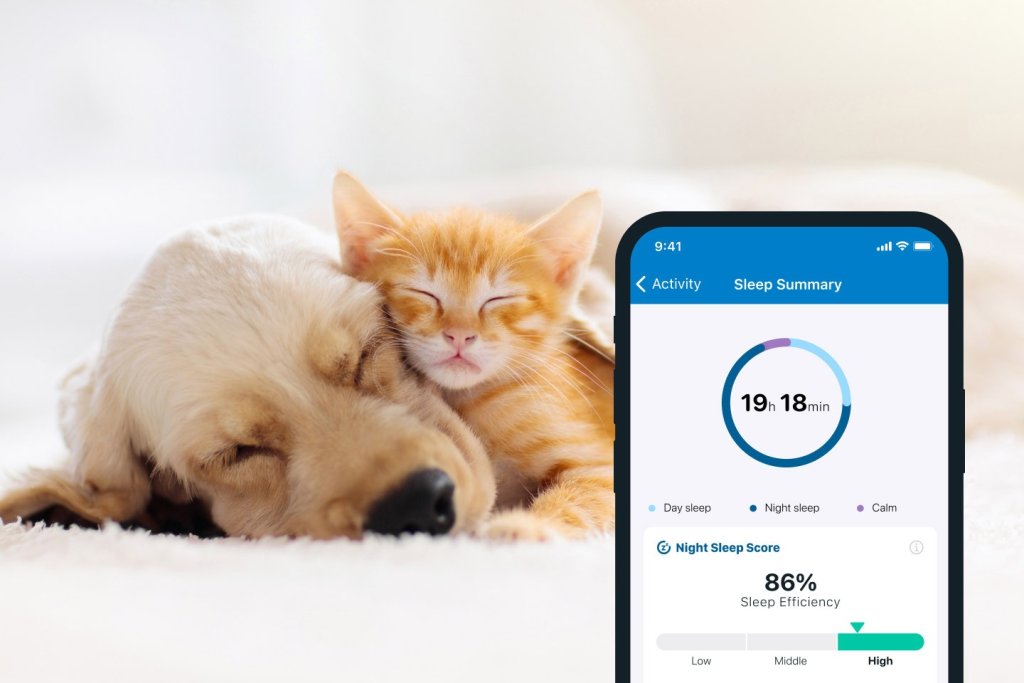
Besides, you might be wondering how to get your dog to sleep through the night – when you need your 8 hours in bed too? It’s not like you can stay awake the whole time recording how many times they woke up or how long they’ve been asleep.
So let your Tractive device do the hard work for you instead. With its AI-powered algorithms, it picks up on your dog’s movements as they sleep. Helping you build a picture of the amount of quality sleep they’re getting – and how often they were disturbed.
Which, in the long run, can help you catch on to a health issue early – and avoid a medical emergency (and staggering vet bills) early on.
Discover GPS & Health Tracking For Dogs
They don’t have proper bedding
You don’t want to sleep on a lumpy old mattress, and your dog probably doesn’t either. A comfortable dog bed can be a key to good sleep for your pup. If your dog does have joint pain or arthritis, for example, it may be worthwhile to invest in a comfortable dog bed.

They’re too hot or cold
Just like humans, the temperature is important for your dog’s nighttime comfort. Check to see if the dog bed is near a chilly draft or too close to a heating vent.
Read more: How cold is too cold for dogs
They’re adjusting to a new environment
Your pooch might feel disoriented if you move to a new home or when you travel, and this can disrupt sleep. So try to recreate the sleeping area and habits that enable your dog sleep through the night at home.
- Bring your dog’s bed or a blanket that smells like home.
- If you are in the habit of using a white noise machine or playing calming music, make sure to have this handy on your first night in a new place to ensure restful sleep.
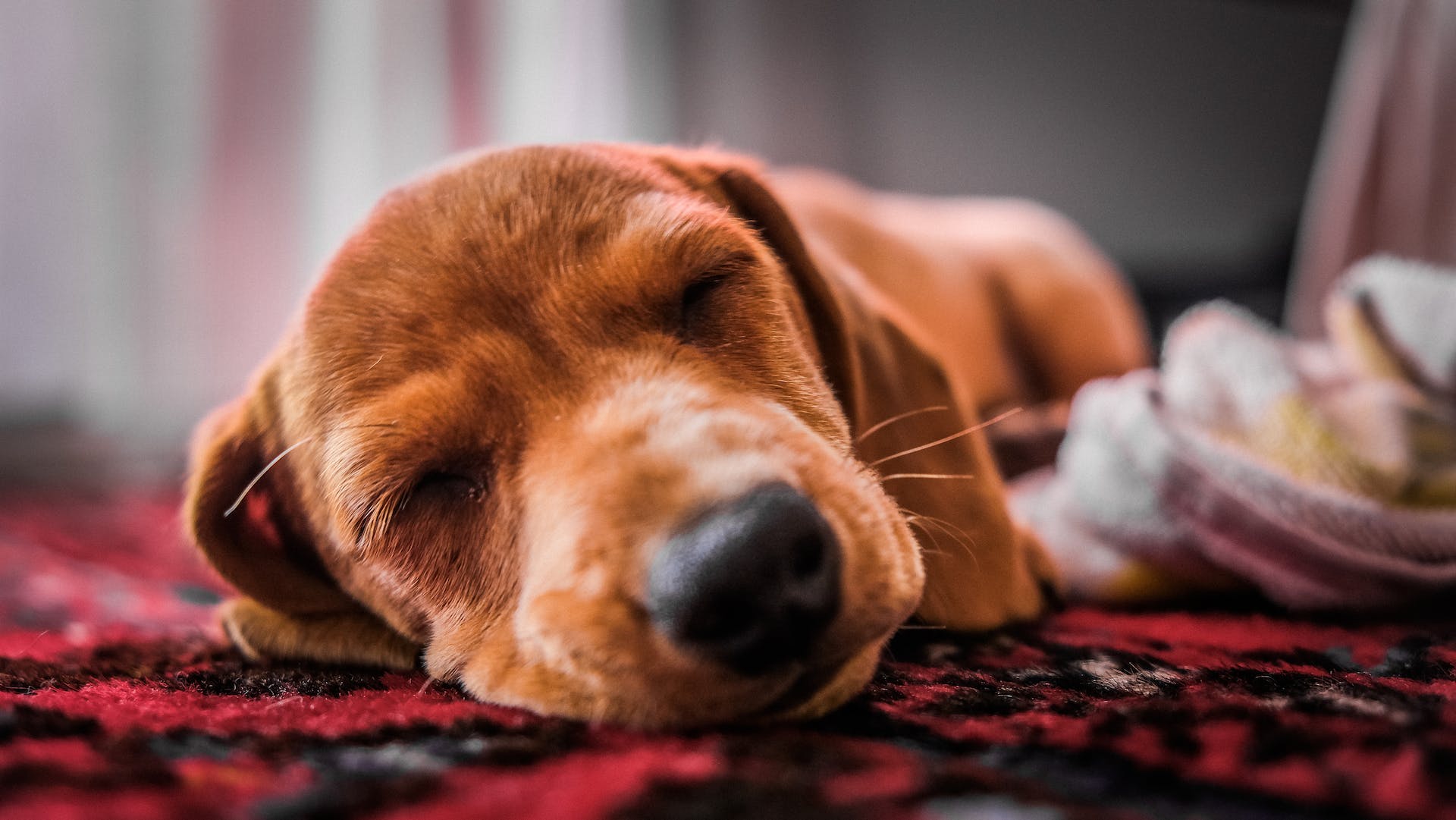
Plan for a few nights of disrupted sleep habits as your pup adjusts to your new home. Look for clues that may be keeping your dog awake, such as headlights from passing traffic or new neighborhood sounds. Address these issues as soon as you can so your dog will get right back into their sleep schedule.
They need to go to the bathroom
Your dog knows that it’s not OK to potty in the house, but what’s a pup to do in the middle of the night when they have to go? Most likely they will wake you up to be let outside to relieve themselves.
They’re struggling with bad dreams
Yes, much like us – dogs can dream and, sadly, even experience nightmares. If you’ve adopted a dog from a shelter, it’s possible they still remember (and react to) any past experiences of abuse or mistreatment. Much like humans, dogs are also capable of experiencing post-traumatic stress disorder (PTSD)2. Which can manifest as nightmares at times and disturb your dog’s sleep.
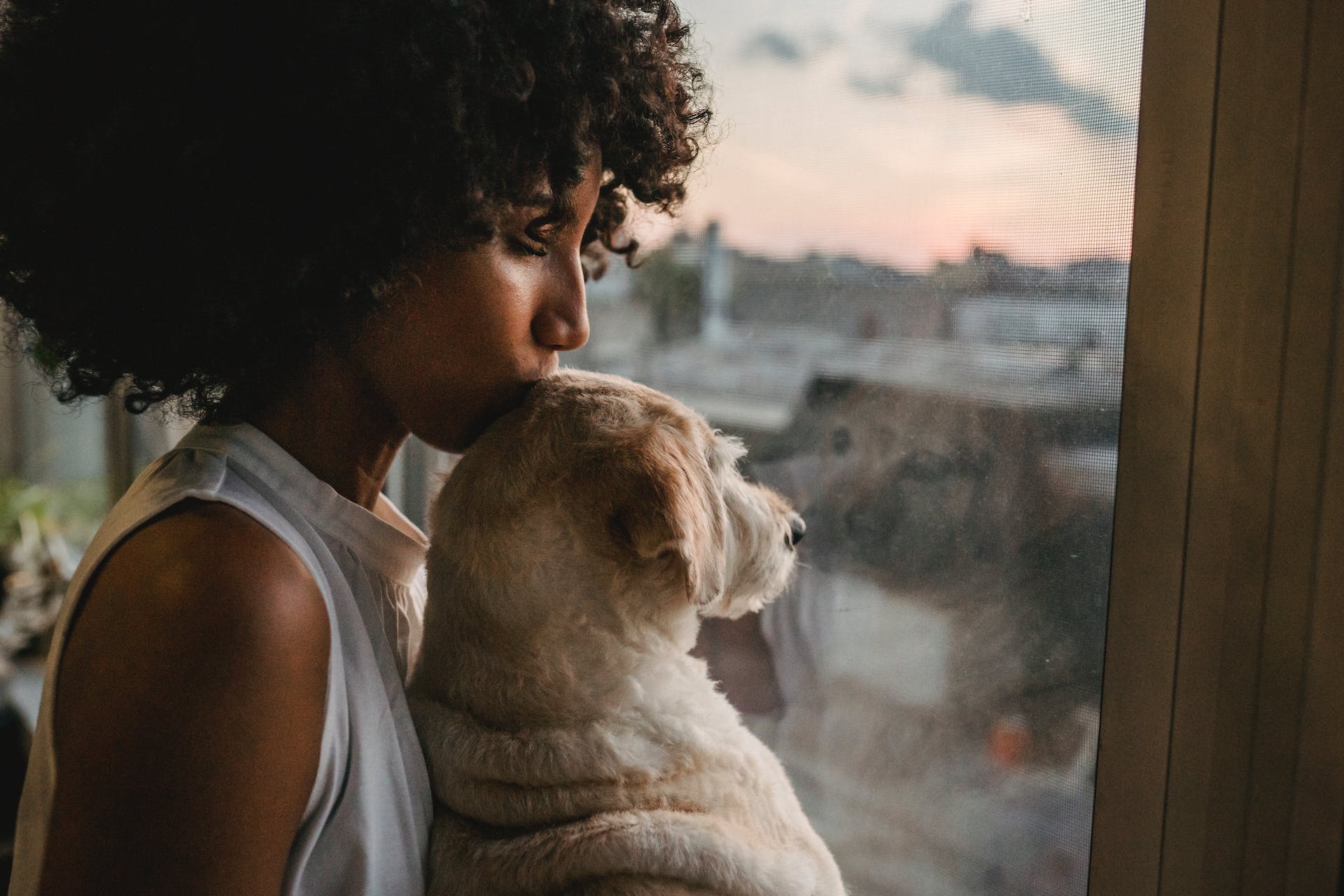
They’re growing old
It feels like one minute your dog’s a little puppy in your arms – and the next, they’re a senior dog, officially graduating to grand-paw status. Dogs tend to reach their “elderly” years by around 7 years (though a bit later for smaller dogs.) And one of the health issues they might face around these years is cognitive decline.
Read more: How to convert dog years to human years
And one of the first signs your senior dog might be experiencing a condition like cognitive dysfunction syndrome? A change in their sleep habits.1 Which you can track on a day to day (or, well night by night) basis with a dedicated pet GPS & health tracker.
So you can catch on to a change early – and get them to a vet before their condition worsens.
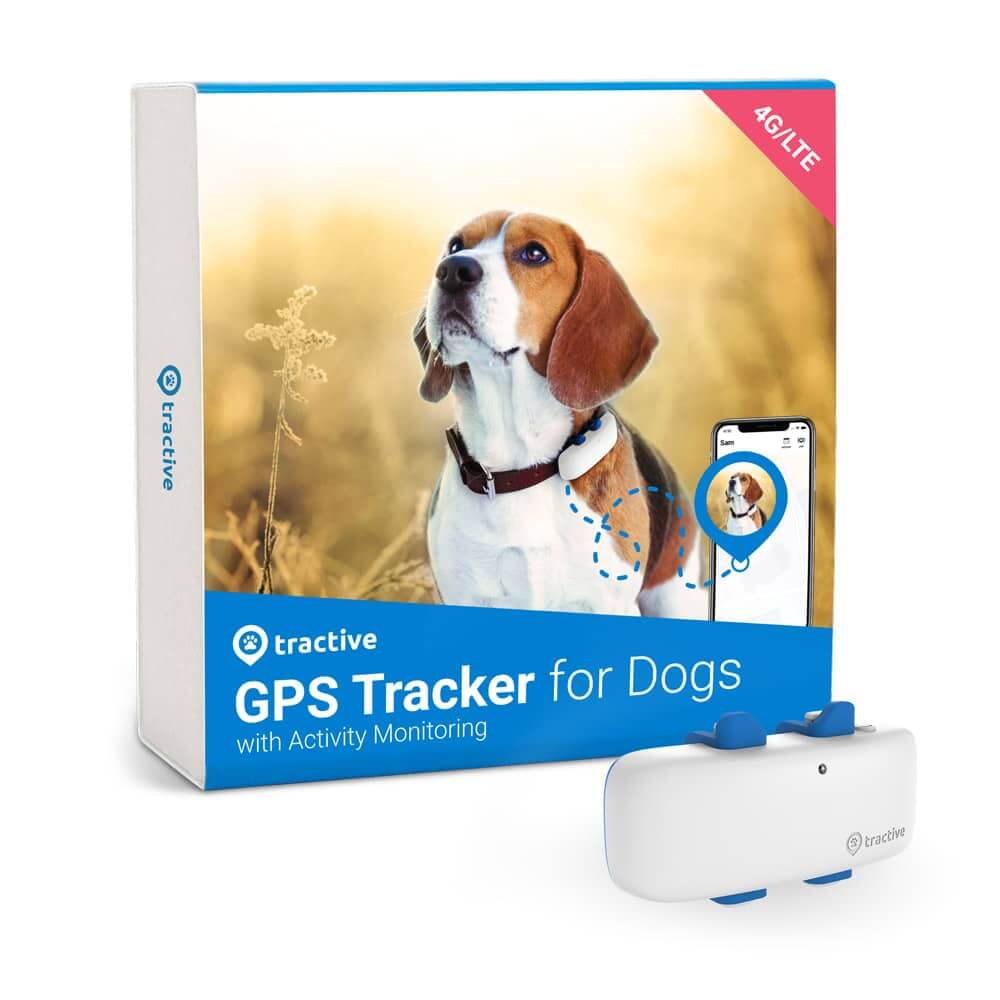
Stay on top of your dog’s wellness
See how they’re doing at a glance with Wellness Score. Set goals. Compare with dogs like yours. Monitor sleep. Detect issues and keep them healthy.
How to get your dog to sleep through the night
Once you understand the cause of your dog’s sleep trouble, you can adjust your pup’s daily routine to promote restful, healthy sleep for your furry friend. It takes planning, but it’s worth the effort to develop good habits that help your adult dog and puppy sleep.
Tire them out: Provide more physical & mental activity
Adult dogs and puppies need physical and mental stimulation, and it’s up to you to provide this for them. So if you’re at home with your dog for all or part of the day, take several walks during the day or engage in vigorous play.
⚠️ If your dog is home alone and spends the day napping or gazing out the window, they are unlikely to be tired enough to go to bed when you and your family are ready to settle down for the night.
For dogs that are alone all day, a long evening walk can help to wear out your pup and provide sensory stimulation. (It’s also good for you!) A high-energy after-dinner play session is fun, too. As a bonus, these activities help to build a bond of trust between you and your pup. Be sure to schedule your pup’s exercise session a few hours before bedtime so they have time to wind down.
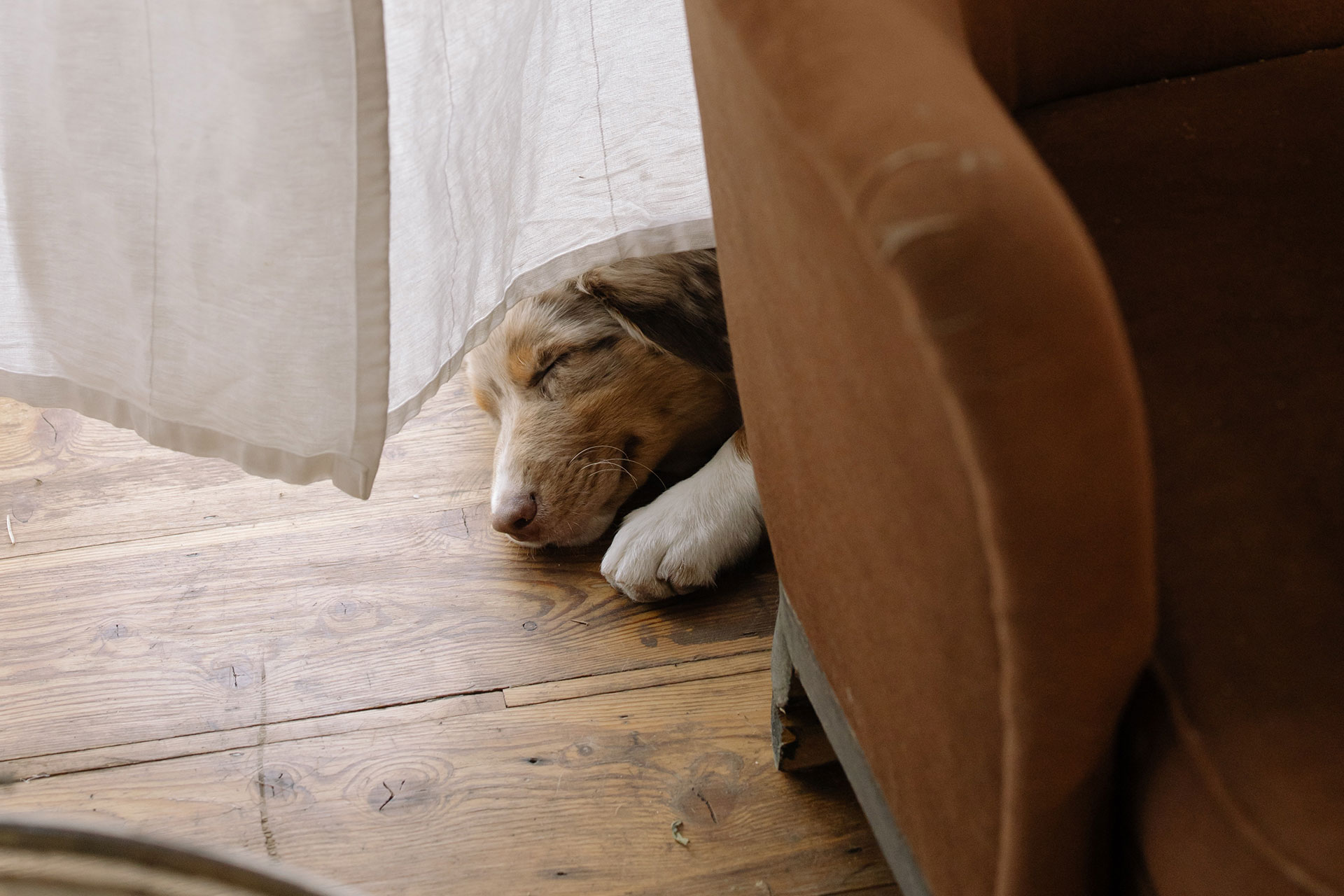
Read more: How To Make Dog Walks More Fun For You And Your Dog
To keep your dog mentally stimulated during the day, try puzzle feeders.
- These devices require your dog to do a little bit of mental “work” to retrieve their dog food or dog treats.
- Your dog might need to tap a button or dig for their food, which makes eating an interactive rather than passive experience, as well as more time-consuming.
- Do some research or talk to your veterinarian and choose a puzzle feeder that’s right for your dog’s size and personality.
A daily dog training session to work on basic commands like “sit” and “stay” can provide physical and mental stimulation. This is also good bonding time for you and your furry friend.
Read more: Training your dog: The Importance of Consistency in Dog Training
Use chew toys to soothe your dog before sleep
Licking and chewing on something can help your dog release stress and relax. Tap into this natural tendency by giving your dog a favorite chew toy before bedtime to help calm them. Coat the chew toy with a little peanut butter to make the chew toy into a tasty bedtime treat.
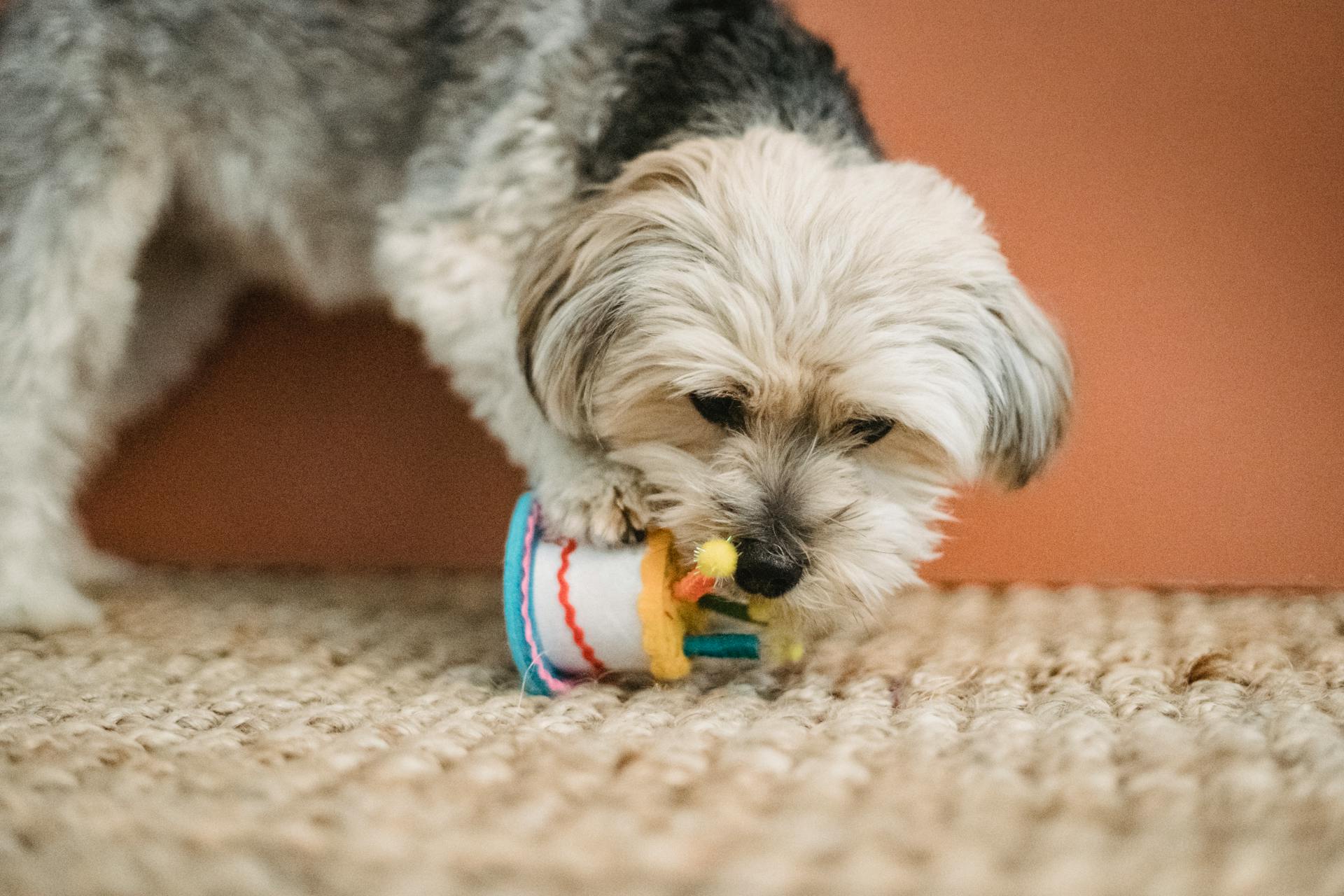
Consider placing the peanut butter-covered chew toy near your dog’s bed as you settle in for the night. Even the most reluctant pup will follow that treat straight into the dog bed!
Check for fleas or any other medical problem
If your dog seems restless and avoids laying down, it may be time for a visit to the veterinarian’s office.
- Does your dog have fleas that cause itching and discomfort?
- Or are there other medical issues, such as arthritis?
Your vet can help to rule out serious health issues and recommend treatments. Once you have your dog’s condition under control, you and your pup can peacefully drift into dreamland for the whole night.
Read more: Why Is My Dog So Itchy? Causes and Solutions For An Itchy Dog
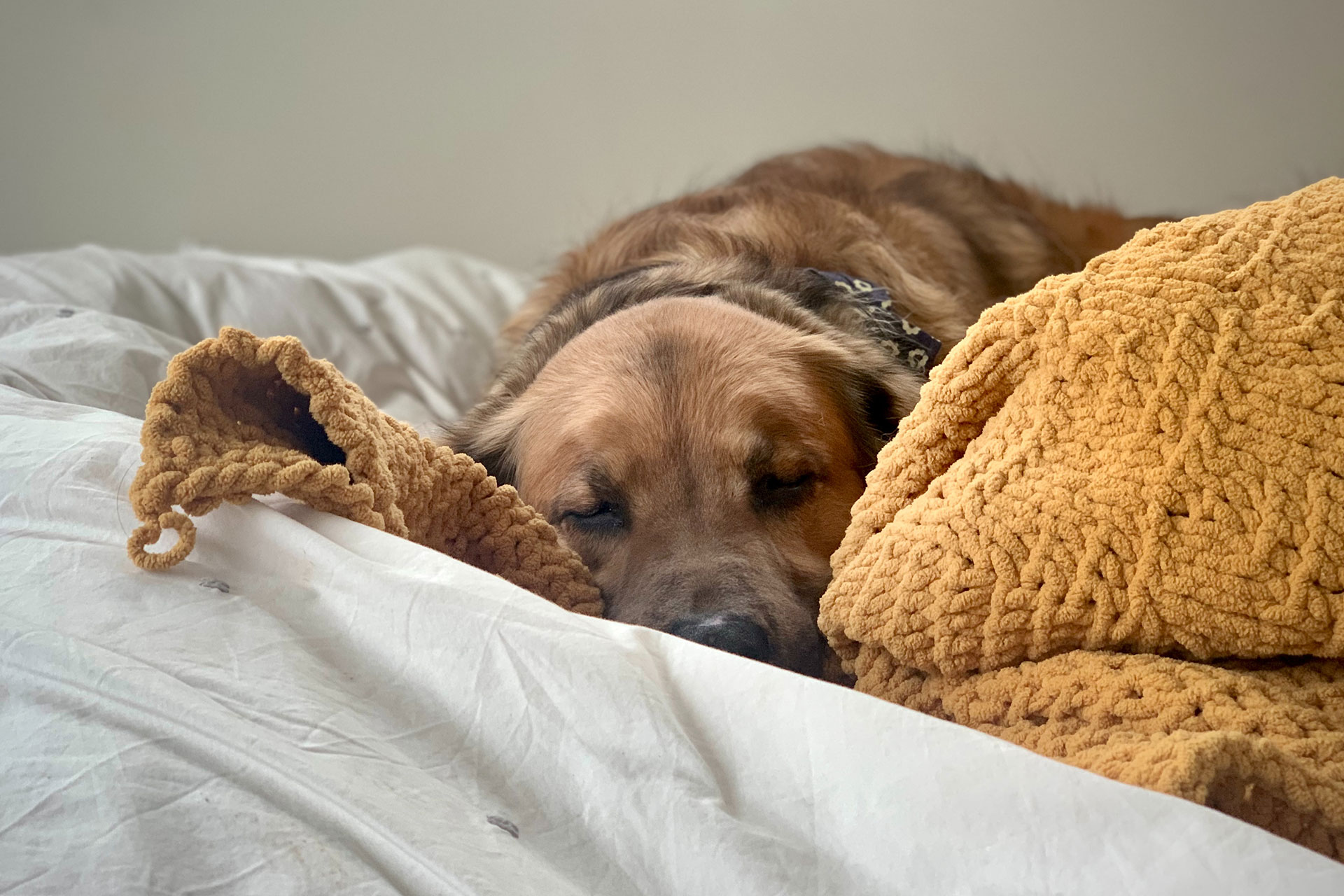
Create a special sleeping area & make them comfy
You might want your pup to sleep beside you in your bed, but this almost guarantees that both of you will wake up during the night. Your dog deserves a comfortable place to sleep that is just for them – and so do you!
Read more: Dog Sleeping in Bed? Pros and Cons of Co-Sleeping With Dogs
You don’t need to spend a lot of money on a fancy dog bed. A soft comforter or blanket folded in the corner of the room may be just what your pup needs for a restful sleep. Or, you can splurge on a fleece-lined memory foam bed for the ultimate doggie luxury.
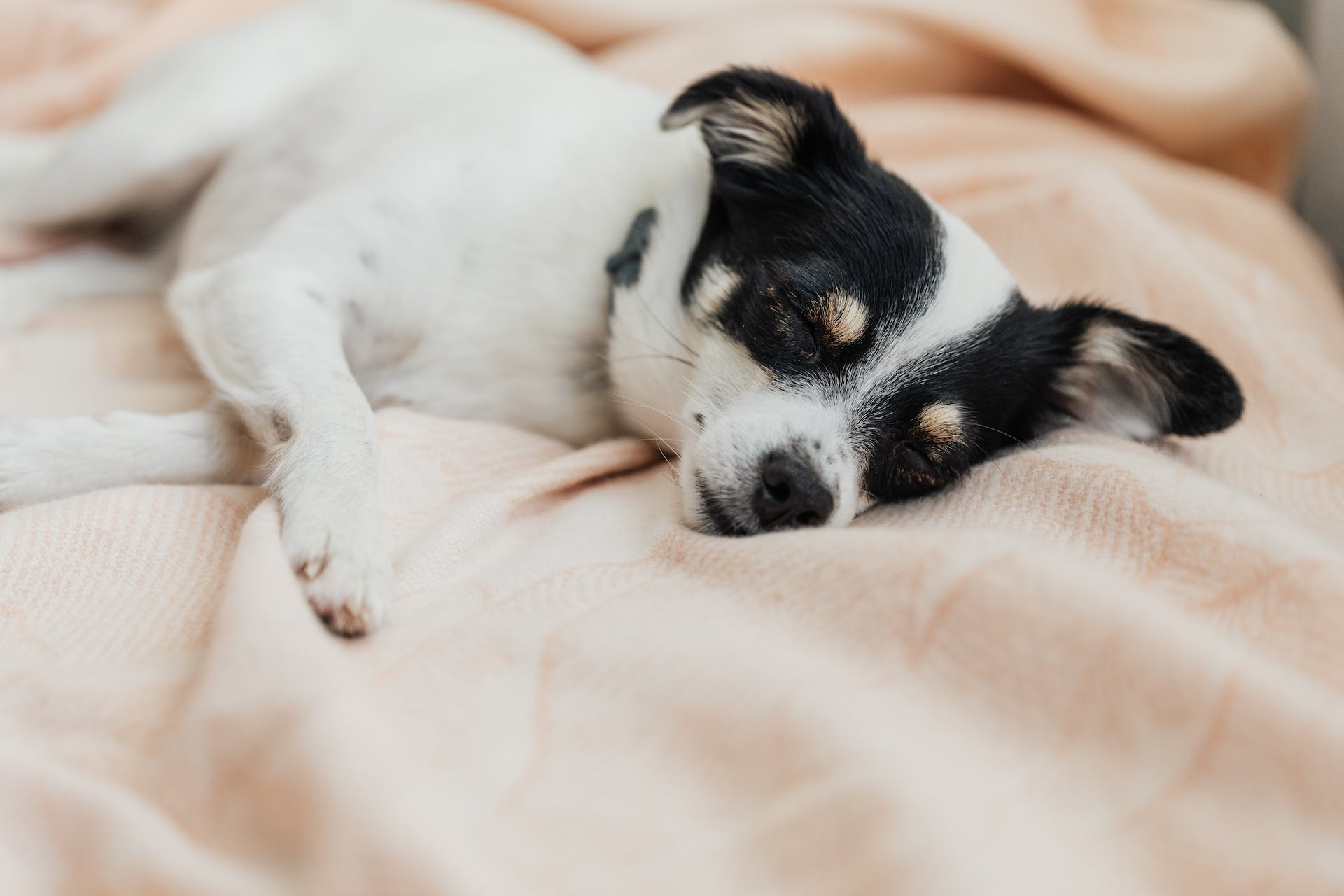
Your dog’s sleeping location matters, too.
- Is the room quiet, or are there pinging electronics nearby that could wake up your pup?
- Trains, traffic, sirens, or anything that could wake you up might also wake your dog.
- Try playing calming music or white noise to block out unwanted sounds that could disturb your pup’s sleep. (Hint: dogs tend to calm down best when listening to soft rock or reggae.)
Some experts suggest that a crate is the best place for your dog to sleep at night. The crate can be a safe home base for your pup, especially if it is associated with positive experiences. Crate training can be an effective way to establish sleep and activity schedules for your adult dog or puppy.
Take bathroom breaks before bed (limit water before bed!)
Staying hydrated is important for your dog’s health, but not if midnight bathroom emergencies wake you up when the dog needs to go outside.
- Try managing your dog’s water intake during the day. Give your dog access to plenty of water all day, and offer extra water after an exercise session.
- But after your dog’s evening meal and accompanying slurp of water, cut back on the amount of water available to your pup.
- Leave a small amount of water in your dog’s water dish overnight. That way, they’ll be able to get a few sips if they awaken, but not drink an entire bowl.
It seems obvious, but remember to let your dog out to do their business right before you go to bed. Do not turn this into a play session. Make sure your dog actually urinates during this last-chance potty break.
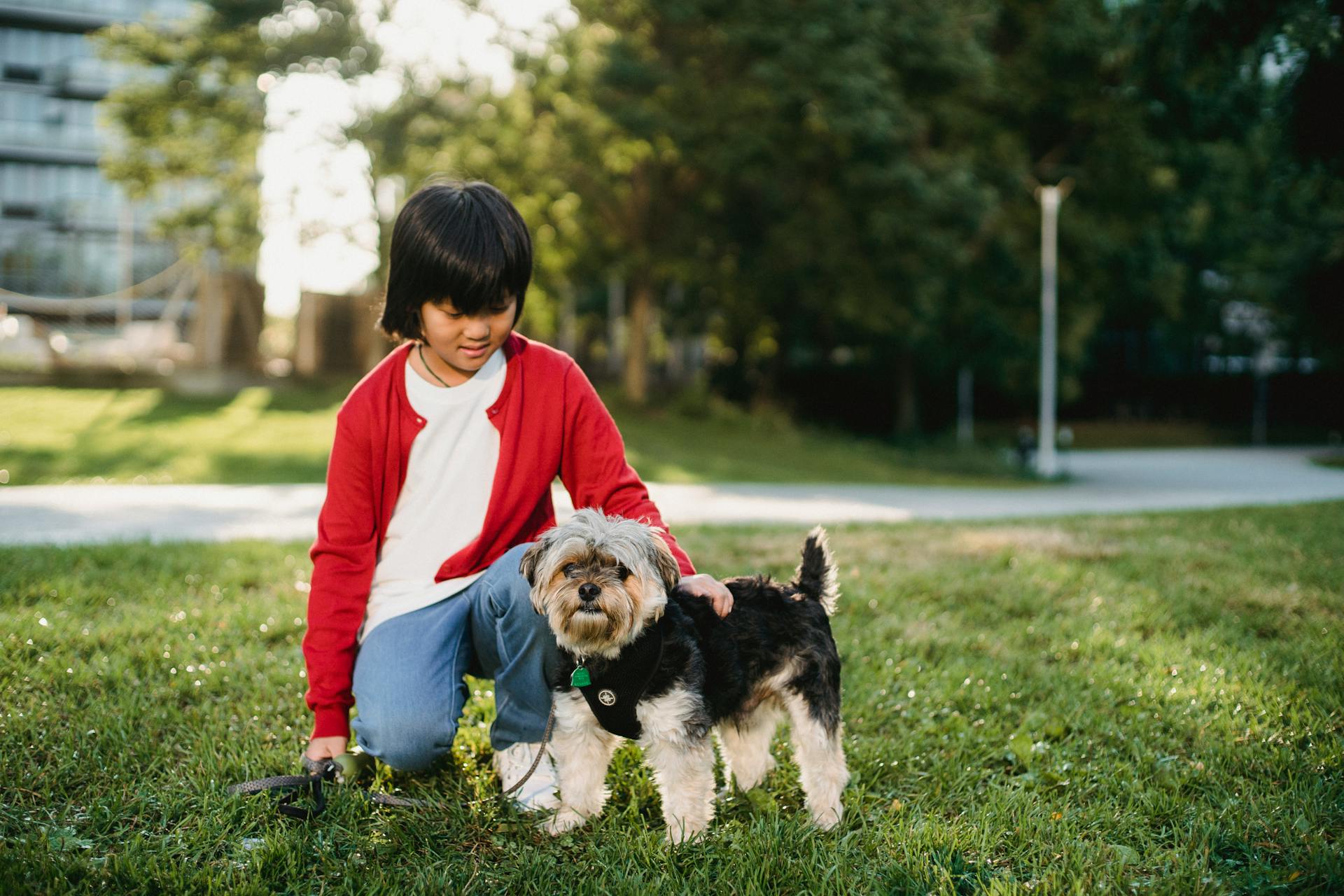
Puppies require a few months to be housebroken and potty trained before they’ll develop the habit of urinating (and not playing) when let outside.
Turn off all of the lights
It’s tough to sleep when the lights are on – there’s just too much stimulation for your pup if their sleeping area is lit up. A quiet, dark space is the key to creating a calming environment for sleep. Close the blinds or curtains, and turn off all the lights. If you like to go to sleep with the television on and your dog is in the same room with you, set your TV to turn off after a certain time period.
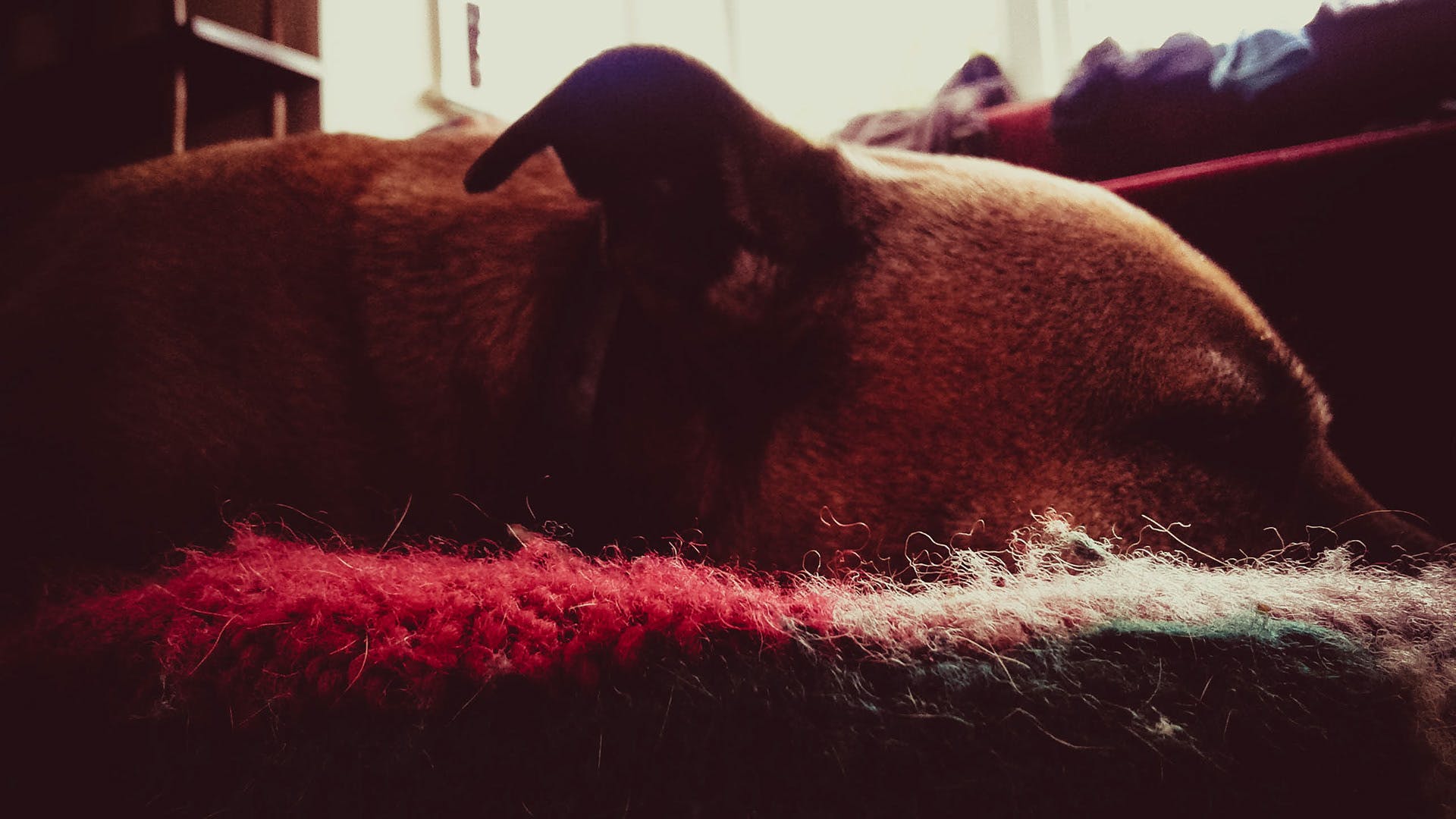
If there’s still a bit of light outside when you and your pup turn in for the night in the summer, for example, consider getting blackout curtains. These light-blocking curtains can clip onto your existing drapes to make the room extra dark and cozy. Plug in a small night light so you don’t stub your toe if you need to get up in the dark.
Read more: 9 Dog Sleeping Positions and Their Meaning: All About Dog Sleep Behavior
A helpful bedtime routine for dogs
Most dogs do better with a routine than a sporadic sleep schedule. Dogs are more comfortable when they know what’s coming next, as opposed to being surprised. Your dog’s schedule should mirror your sleep schedule to keep your life running smoothly. In other words, you want your pup to go to bed when you do, and wake up when you rise in the morning.
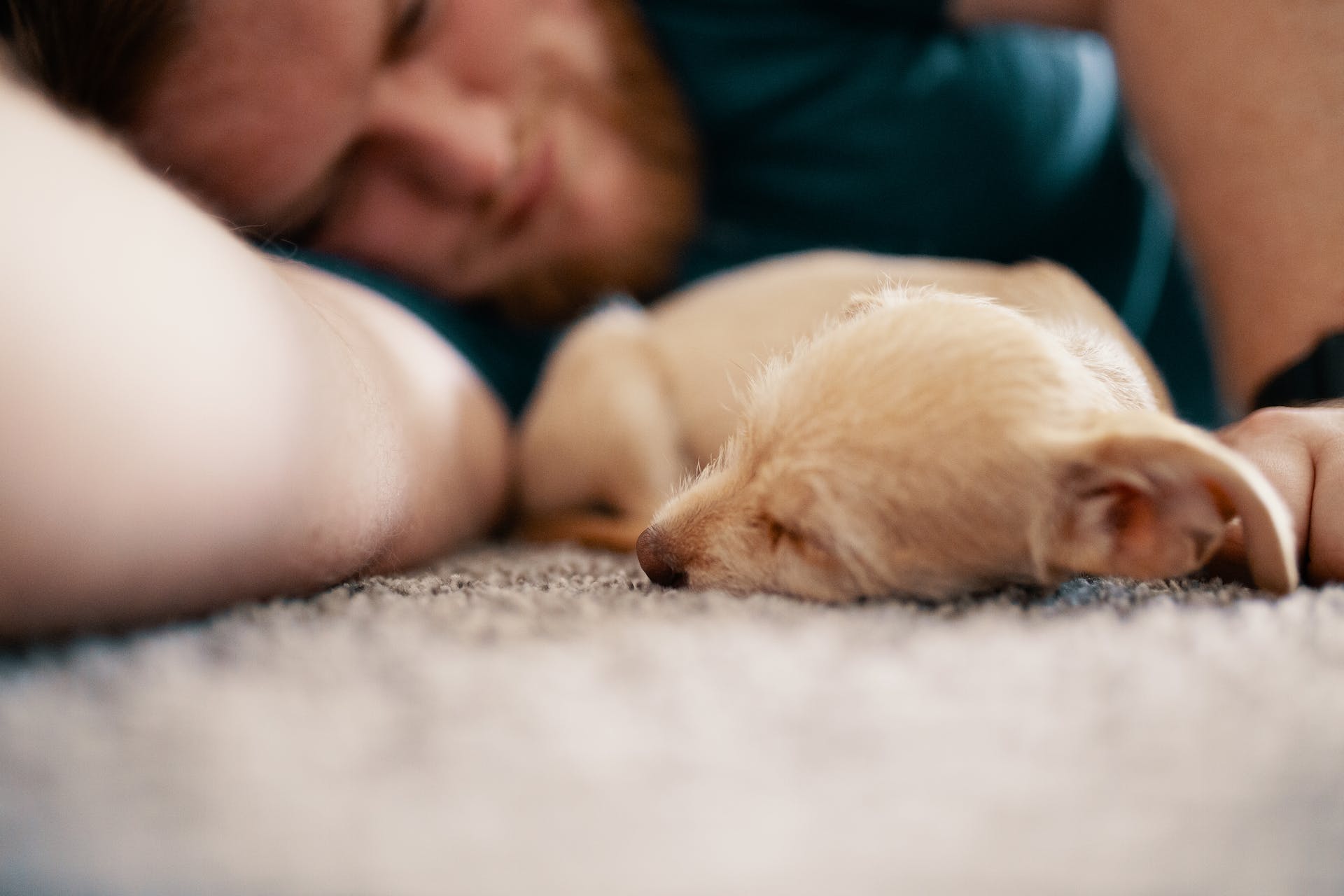
Here’s a sample evening routine:
- Playtime. When everyone’s back home, designate someone to engage the dog in a vigorous play session to burn off the energy your pup built up during the day.
- Mealtimes. Feed your dog dinner at about the same time as your family is eating. This will give your dog plenty of time to digest their meal before bedtime.
- Post-meal walkies. After dinner, take your pup for as long a walk as you have time for.
- Post-walk chillout time. Let your dog relax after your walk. Enjoy some cuddle time or give your pooch a gentle massage. Start turning off lights and electronics in the house.
- One last potty break. By this point in your evening routine, your dog should know that it’s almost time for sleep. Let them out for one last toilet break.
- Chew toy. As they climb into their bed, offer a peanut butter-coated chew toy.
- Turn out the lights. Close the curtains, turn on some calming music or white noise, and darken the room as you leave.
- Finally, hop into bed for your own well-deserved rest at the end of a busy day.
💡Your dog’s Activity Tracking data can help you get an idea of whether they’ve had enough exercise or not. Helping you better figure out if they still need some tiring out before bedtime.
Activity & sleep tracking can even help save your dog’s life
With your dog’s Sleep Tracking data at hand, you’re more likely to catch on to a change in their sleep patterns early. Which can help you pre-empt a health condition, get your dog to a vet on time, and avoid having to pay a ton in medical bills.
Like this Tractive dog parent who caught on to a change in her dog’s behaviors from their Wellness profile – which turned out to be a sickness.
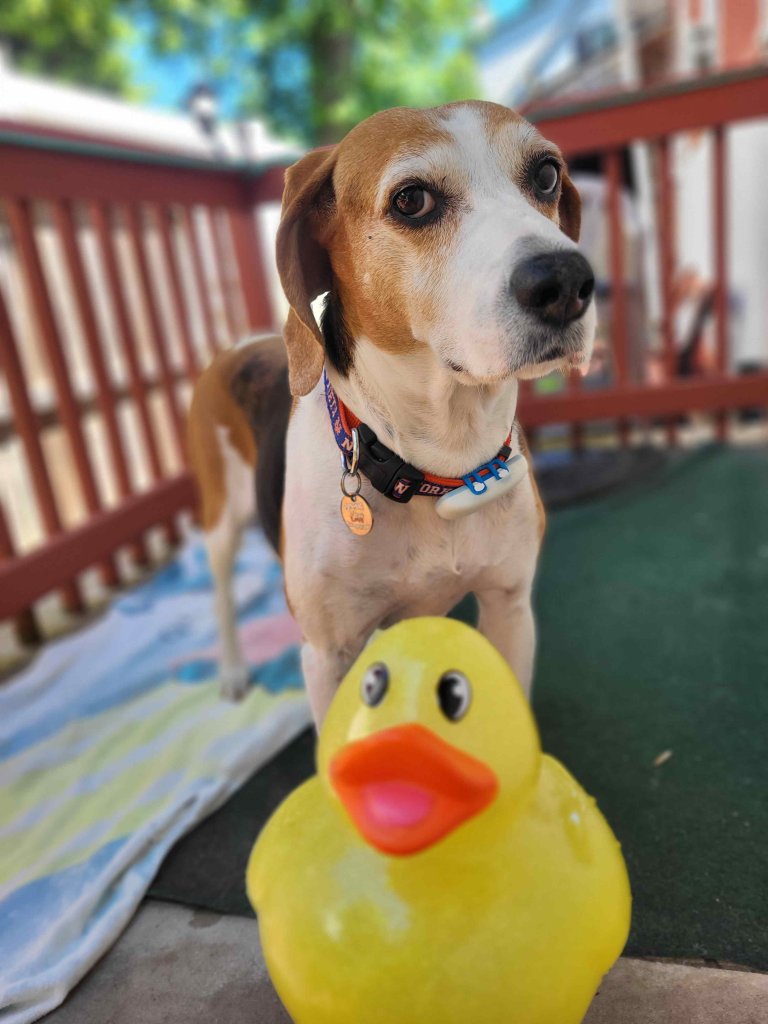
“When I looked at Ruby’s Wellness profile, the data showed that her activity level was low and that she hadn’t slept well. I was concerned and watched her carefully.
Early the next morning, she had blood in her urine and was lethargic. We visited the emergency veterinarian, and Ruby was diagnosed with a UTI.
She received antibiotics and pain medication and is feeling much better. Her tracker data made me aware that she was not acting normally and that something could be wrong with her.
I love her tracker, and I will always have one for any dog I ever own.“
– Katie J, Delaware
And here are some other happy Tractive dog parents from around the world, staying on top of their buddies’ health and wellness:
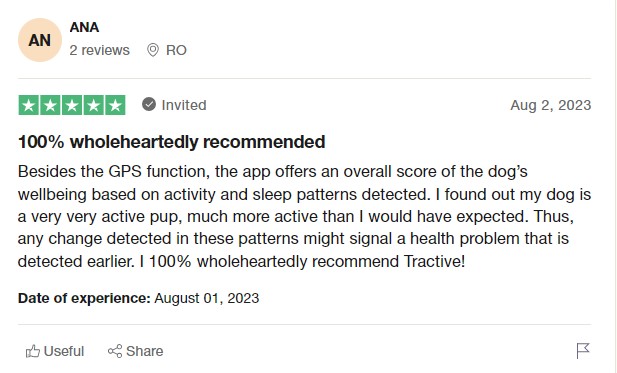
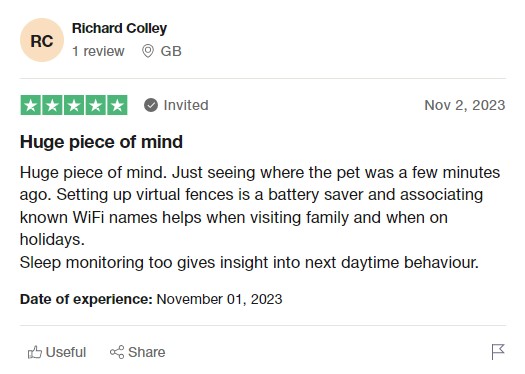
Discover GPS & Health Tracking For Dogs
Want a vet’s take on how to get your dog to sleep through the night? Here’s Dr. Michael Lazaris sharing his best tips:
And if you’ve found this post useful or know a loved one with an insomniac dog at home – share this post with them. So we can create a safer, healthier world for our buddies, one snooze at a time.


